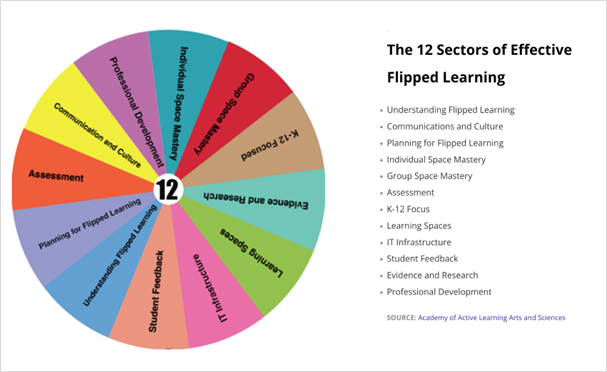The Twelve Sectors of Flipped Learning 3.0 are a comprehensive framework that can help educators implement flipped learning in their classrooms. By understanding and applying the principles of these twelve sectors, educators can create a successful flipped learning environment that benefits all learners. The Flipped Learning 3.0 framework model encompasses these twelve essential sectors to contribute to creating an effective and engaging learning environment. Each sector plays a vital role in the overall implementation and success of the Flipped Learning approach.
- Flexible Environment
This sector emphasizes creating adaptable learning spaces, whether physical or virtual, to accommodate various learning preferences and needs. It encourages students to access course materials anytime, anywhere, fostering a personalized and self-paced learning experience. - Learning Culture
The learning culture sector focuses on promoting a positive and collaborative learning environment. It nurtures a growth mindset, encouraging students to take ownership of their learning and fostering a sense of community and support among learners. - Intentional Content
In this sector, educators carefully curate and develop content that aligns with learning objectives and meets students‘ specific needs. The content is designed to engage and challenge learners, encouraging them to explore concepts independently. - Professional Educator
Educators take on the role of facilitators and mentors in the professional educator sector. They guide students through the learning process, offering support and individualized feedback to enhance comprehension and skill development. - Technology Integration
This sector emphasizes the strategic use of technology to enhance learning experiences. Educators leverage digital tools and platforms to deliver content, promote collaboration, and provide interactive learning opportunities. - Differentiated Instruction
The differentiated instruction sector focuses on tailoring teaching methods and content delivery to accommodate diverse learning styles and abilities. Educators use various approaches to meet the individual needs of their students effectively. - Active Learning
Encouraging active learning experiences is the essence of this sector. Students are engaged in meaningful, hands-on activities, discussions, and problem-solving tasks, fostering critical thinking and more profound understanding. - Student Ownership
This sector empowers students to take responsibility for their learning journey. They are encouraged to set goals, monitor their progress, and reflect on their learning process, promoting a sense of autonomy and self-directed learning. - Research-Informed Practice
Informed by educational research, this sector emphasizes evidence-based teaching strategies and the continuous improvement of instructional practices. Educators use data and feedback to refine their methods and optimize learning outcomes. - Competency-Based Assessment
Competency-based assessment is a core aspect of this sector, focusing on evaluating students‘ mastery of specific skills and knowledge rather than relying solely on traditional exams. Assessments are formative and provide valuable insights into student progress. - Feedback and Revision
The feedback and revision sector stresses the importance of timely and constructive feedback for students. Learners are encouraged to use feedback to revise and improve their work continually, promoting continuous learning and growth. - Community Partnerships
This sector recognizes the value of engaging with external partners, such as parents, local organizations, or industry professionals. These partnerships enrich the learning experience by providing real-world perspectives and opportunities for application beyond the classroom.
About the author: Peter Mazohl is the head of the European Initiative of Education (EBI/EIE), an international adult training and research association. He has a background in science and education and has been involved in training and research in the field of blended learning for over 20 years.
Mazohl’s training activities focus on Flipped Learning, Distance Learning, and the use of Multimedia and Interactivity in learning. He has developed and delivered training courses for teachers, trainers, and other professionals in these areas. He has also conducted research on the effectiveness of blended learning and has published papers in academic journals and conferences.

